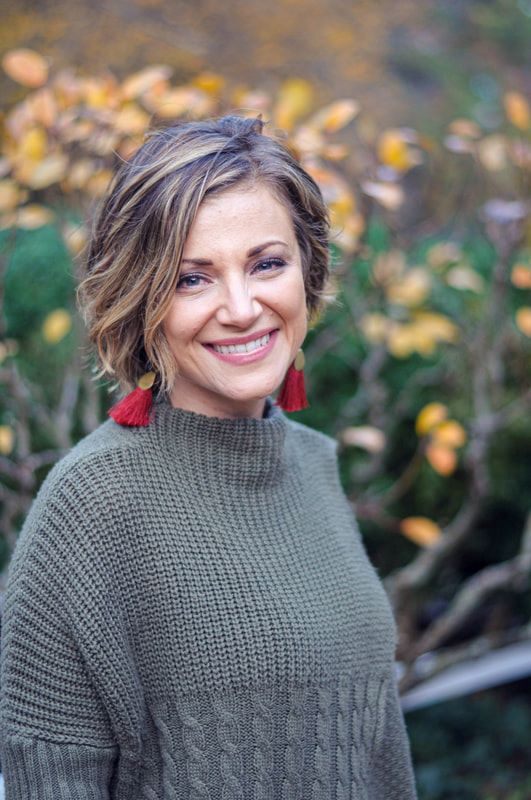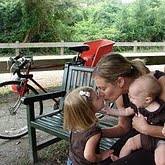That is, until it came bleeding on my porch, knocking on my door. Then it broke my door down.
Since moving out of downtown, I realize we might have lived in a bit of a cocoon there. We knew our neighbors, and mostly we were surrounded by longtime city dwellers or medical residents. We looked out for each other. The closest we ever came to crime was a mugging across the street, in broad daylight, where our neighbors ran the guy down, beat him up, and pinned him down until the police arrived. Our cars were rifled through the couple of times we left them unlocked, but we expected that. Though I've never loved spending nights alone, we really didn't worry.
Then a few months ago, we moved to the outskirts, to a lovely and well-connected neighborhood. We already know more neighbors than we did in years at the old place, and we are in more frequent contact. But our historic and beautiful neighborhood borders on a different Baltimore. Not the one that shimmers on the waterfront, commanding high rents, empty nesters and advanced degrees. This Baltimore is the one outsiders think of-- the one from The Wire (which I still refuse to watch). I can see it from my bedroom window and, as it turns out, it can see me. It doesn't care about my picket fence or my young children. It doesn't care about me. Only what I have that it can take.
One night, a couple months ago we sat on our porch to catch our breath at the end of a long day. We heard a gunshot. Close. When we lived downtown, I claimed to have heard them all the time. Daniel always dismissed them as firecrackers, which they probably were (the large and loud Israeli family across the street celebrated even the smallest occasion, say, Tuesday, with firecrackers). But this time, we knew what it was right away.
It is strangely silent after a gunshot. I expected to hear a revving engine or a wailing voice or maybe even another shot. But it was silent. We saw a young man run onto our street, then scramble over a fence and into our neighbor's yard. We went inside to find her number, then on the back patio for several minutes until we heard the sirens approaching. When we called her on our way back inside, she said, "Are you calling about the guy knocking on your door?" In the few minutes we had been out back, the gunshot victim, the one we'd seen, had come to our door seeking help, bleeding all over our porch. We never heard him knocking and didn't see him before he got into a car and left. Still, we were up all night, a helicopter hovering over our house, flashing lights in our yard. First we talked to police, then we waited for the crime lab, then we lay awake in bed. In the morning we awoke to find blood still spattered on our steps. We were shaken, but reminded ourselves that he had only sought our help. We were not targets.
I had long consoled myself that violent crime in Baltimore, by and large, was an inside job. Those convicted (or accused) of gun-related charges are very often also the targets of gun-related crime (I once saw a statistic I can't find that put that percentage in the high 90s). Sure, there are random acts, but they are far less frequent. This victim on the doorstep incident was unsettling, obviously, but it didn't challenge my thinking. When tracked down and questioned by police of his whereabouts at the time of the shooting, he made a story up about how he'd just been "at the store." He was, in all likelihood, far from innocent.
Things slowly got back to normal. Until several weeks later when Daniel kept calling from Chicago while I was on my way to work. Running late, I had dialed into a meeting I should have already been in. I clicked over to see what was wrong, and he told me our alarm was going off. This was a familiar routine for us. We have always had an alarm since living in the city, and sometimes they go off for no reason. Police are usually dispatched, they check it out, only let us know if something's wrong, and charge a fee for a false alarm. This time it wasn't false.
When I got home, after my sweet neighbor and my mom, the police were already gone, having determined the assailant "didn't get in." It didn't take me long to determine they were wrong. After trying to kick our door in, he had broken the glass and climbed through. Due to a faulty sensor, our alarm did not go off immediately; not until he was walking through our house. At that point, he took the easiest thing he could grab, my laptop, dropped a small TV on the floor and ran. We were terribly fortunate.
I was distraught; the busted door a glaring reminder of what he had taken, and that it was more than I knew how to replace. That day I dealt with a somber parade of police officers, a crime lab technician, handyman, ADT, concerned neighbors and family. Our neighbors, family, and landlord have been wonderfully supportive, offering a place to go, company, and enhanced security measures. I am on a first-name basis with the technician who replaced and reinforced alarm sensors and showed up the day of the incident. Meanwhile, by the time Daniel got home, all evidence had been removed, wiped down, swept and vacuumed. It must have been surreal. We don't yet know what we will do.
I am struck by the complexity of it all-- I am struggling with whether I should even have written this. It is terrible to be a victim—to feel vulnerable, watched, powerless. Really, though, I can't say anything has changed. Nothing is different than it was before; this risk was always here. When I look out the window at my other city, it's not what you might think. Certainly, there are people out there without useful purpose, without conviction, who will take what is not theirs. But they are not what I see. I see young boys in football pads, fresh from practice. I see women coming home in scrubs, heavy laden, to cook dinner for their children. I see little girls laughing. I see fathers playing with their sons. What I see and don't see is larger than race or money, more complicated than it might seem.
When the other Baltimore came knocking, I did nothing. And I guess that's all I could do. But I am perplexed by my desire to balance protecting my own and having compassion for others who want to do the same. That white picket fence is a vulgar divider.
 RSS Feed
RSS Feed


